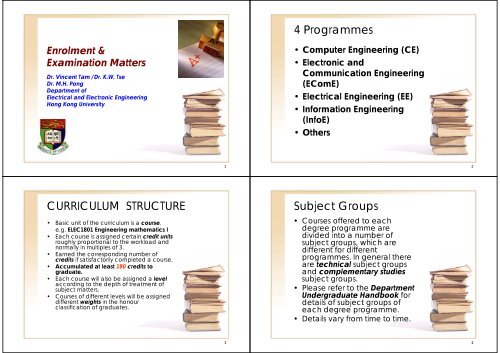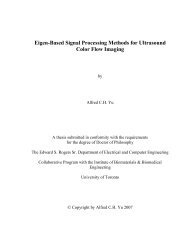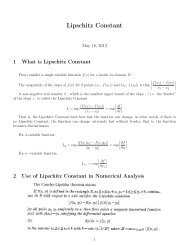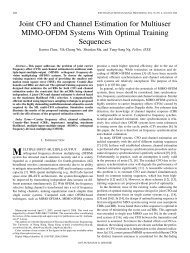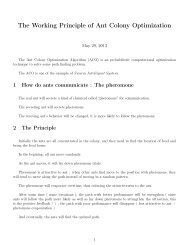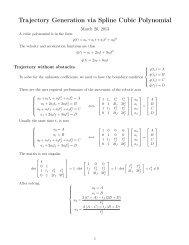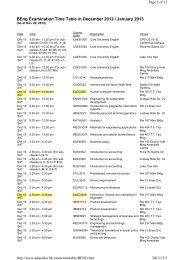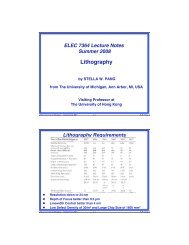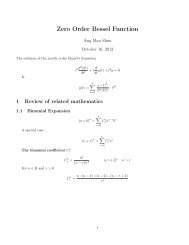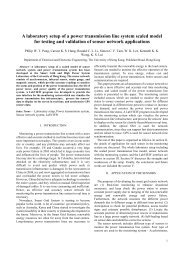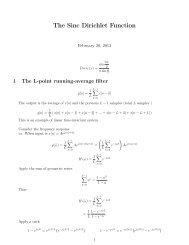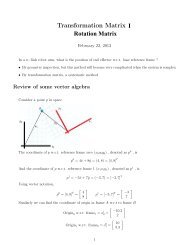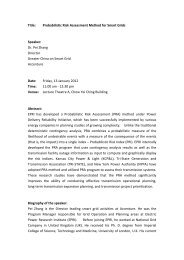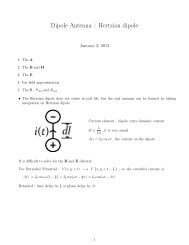Examination Matters - Department of Electrical and Electronic ...
Examination Matters - Department of Electrical and Electronic ...
Examination Matters - Department of Electrical and Electronic ...
You also want an ePaper? Increase the reach of your titles
YUMPU automatically turns print PDFs into web optimized ePapers that Google loves.
4 Programmes<br />
Enrolment &<br />
<strong>Examination</strong> <strong>Matters</strong><br />
Dr. Vincent Tam /Dr. K.W. Tse<br />
Dr. M.H. Pong<br />
<strong>Department</strong> <strong>of</strong><br />
<strong>Electrical</strong> <strong>and</strong> <strong>Electronic</strong> Engineering<br />
Hong Kong University<br />
• Computer Engineering (CE)<br />
• <strong>Electronic</strong> <strong>and</strong><br />
Communication Engineering<br />
(EComE)<br />
• <strong>Electrical</strong> Engineering (EE)<br />
• Information Engineering<br />
(InfoE)<br />
• Others<br />
1<br />
2<br />
CURRICULUM STRUCTURE<br />
• Basic unit <strong>of</strong> the curriculum is a course.<br />
e.g. ELEC1801 Engineering mathematics I<br />
• Each course is assigned certain credit units<br />
roughly proportional to the workload <strong>and</strong><br />
normally in multiples <strong>of</strong> 3.<br />
• Earned the corresponding number <strong>of</strong><br />
credits if satisfactorily completed a course.<br />
• Accumulated at least 180 credits to<br />
graduate.<br />
• Each course will also be assigned a level<br />
according to the depth <strong>of</strong> treatment <strong>of</strong><br />
subject matters.<br />
• Courses <strong>of</strong> different levels will be assigned<br />
different weights in the honour<br />
classification <strong>of</strong> graduates.<br />
Subject Groups<br />
• Courses <strong>of</strong>fered to each<br />
degree programme are<br />
divided into a number <strong>of</strong><br />
subject groups, which are<br />
different for different<br />
programmes. In general there<br />
are technical subject groups<br />
<strong>and</strong> complementary studies<br />
subject groups.<br />
• Please refer to the <strong>Department</strong><br />
Undergraduate H<strong>and</strong>book for<br />
details <strong>of</strong> subject groups <strong>of</strong><br />
each degree programme.<br />
• Details vary from time to time.<br />
3<br />
4
How many units are you expected<br />
to take?<br />
•The normal load is 30 units<br />
per semester.<br />
∴total loading over 3 years<br />
= 3 x 2 semesters/year x 30<br />
units/semester<br />
= 180 units<br />
• You may take a maximum<br />
<strong>of</strong> 39 units<br />
Technical Subjects<br />
Technical subjects are identified as:<br />
• Core courses<br />
Compulsory fundamental courses.<br />
• Breadth courses<br />
Level 1 or Level 2 optional courses<br />
(<strong>of</strong>ten serve as pre-requisites for<br />
certain depth courses).<br />
• Depth courses<br />
Normally level 3 optional courses in<br />
specialised areas.<br />
Each programme has its own<br />
requirements in terms <strong>of</strong> core, breadth<br />
& depth courses <strong>and</strong> also the<br />
distribution among subject groups.<br />
5<br />
6<br />
Complementary Studies<br />
• Language Enhancement Courses<br />
(9 units compulsory for all<br />
programmes)<br />
• Specified Engineering Related<br />
Courses<br />
– Engineering <strong>and</strong> Society<br />
(compulsory for all programmes)<br />
– Engineering Organization &<br />
Management<br />
(compulsory for CE/EComE/EE)<br />
– Engineering Economics & Finance<br />
(compulsory for CE/EComE/EE)<br />
– Business <strong>and</strong> related studies<br />
Other Broadening Courses<br />
• Humanities <strong>and</strong> Social<br />
Sciences Studies<br />
• Culture <strong>and</strong> Values Studies<br />
• Other Inter-faculty<br />
Electives<br />
7<br />
8
ADVICE<br />
• Different degree programmes have<br />
different graduation requirements.<br />
• It is your responsibility to ensure that<br />
you have earned enough credits in<br />
the proper combinations <strong>of</strong> courses<br />
for graduation as specified in the<br />
<strong>Department</strong> Undergradute H<strong>and</strong>book.<br />
• Website for enrolment matters<br />
http://www.eee.hku.hk/intranet/unde<br />
rgrad/enrol.htm<br />
• Be careful when enrolling courses.<br />
ASSESSMENT<br />
• Each course will be assessed by<br />
coursework assigned<br />
throughout the course <strong>and</strong>/or<br />
by a written examination held<br />
at the end <strong>of</strong> the semester.<br />
• Two types <strong>of</strong> coursework:<br />
• Practical Work - laboratory<br />
based.<br />
• In-course Assessment -tests,<br />
problems, essays etc.<br />
9<br />
10<br />
ASSESSMENT<br />
Practical Work (PW)<br />
In-course<br />
Assessment (IA)<br />
Combined Mark (CB)<br />
<strong>Examination</strong> (EX)<br />
<strong>Examination</strong> &<br />
Assessment (EA)<br />
ASSESSMENT<br />
• To pass a course, a student<br />
must pass both PW <strong>and</strong> EA<br />
components separately.<br />
• Note, however, not all courses<br />
have all the three components.<br />
• Students will be informed by the<br />
Faculty/<strong>Department</strong> <strong>of</strong> the<br />
relative weightings assigned to<br />
the different components early<br />
in the academic year.<br />
11<br />
12
GRADES & GRADE POINTS<br />
Failure in a course<br />
• COURSE MARKS ( 0 … 100 % )<br />
‣ GRADES ( F, D … A+ )<br />
‣ GRADE POINTS G ( 0, 1, …, 4.0 )<br />
‣ Except Workshop training & Industrial Trainng<br />
St<strong>and</strong>ard<br />
Excellent<br />
Good<br />
Satisfactory<br />
Sufficient<br />
Marks<br />
≥85<br />
≥80<br />
≥75<br />
≥71<br />
≥68<br />
≥65<br />
≥62<br />
≥59<br />
≥56<br />
≥53<br />
Grade<br />
A+<br />
A<br />
A-<br />
B+<br />
B<br />
B-<br />
C+<br />
C<br />
C-<br />
D+<br />
Grade Point<br />
4.0<br />
4.0<br />
3.7<br />
3.3<br />
3.0<br />
2.7<br />
2.3<br />
2.0<br />
1.7<br />
1.3<br />
• Failure in PW or EA<br />
• Failed a core/compulsory course.<br />
– Must retake the failed course when it is<br />
next held.<br />
– (Retake - attend formal classes <strong>and</strong> do<br />
all PW, IA <strong>and</strong> EX as specified for that<br />
course.)<br />
• Failed a non-core/non-compulsory<br />
course.<br />
– May choose to retake the course or<br />
choose other courses as a<br />
replacement.<br />
• The <strong>Department</strong> <strong>of</strong> EEE would not <strong>of</strong>fer<br />
special examinations in summer for<br />
borderline failures.<br />
≥50<br />
D<br />
1.0<br />
Fail<br />
UNSATISFACTORY PROGRESS<br />
• A student is considered to be making<br />
unsatisfactory progress for the year if<br />
he<br />
– achieved a year-end YGPA below 1.3,<br />
or<br />
– accumulated at the end <strong>of</strong> an<br />
academic year less than half <strong>of</strong> the<br />
credits expected <strong>of</strong> a student under<br />
normal load, i.e. 30 credits.<br />
• A student will be recommended for<br />
discontinuation if any one <strong>of</strong> the<br />
following 3 situations occurs<br />
– failed a core course three times;<br />
– achieved a year-end YGPA below 1.3<br />
for two consecutive years;<br />
– accumulated at the end <strong>of</strong> an<br />
academic year less than half <strong>of</strong> the<br />
credit units expected <strong>of</strong> a student<br />
under normal load for two consecutive<br />
years.<br />
17<br />
WGPA <strong>and</strong> DEGREE CLASSIFICATION<br />
• Each course will be<br />
assigned a certain weight<br />
(W).<br />
For Engineering/Technical courses <strong>of</strong>fered by EEE,<br />
Weight = Level, e.g. ELEC1303<br />
level = weight = 1<br />
18<br />
WGPA <strong>and</strong> DEGREE CLASSIFICATION<br />
For Complementary Studies courses,<br />
• Language Enhancement Courses 1<br />
• Broadening Courses 1<br />
• Engineering Organization &<br />
Management 2<br />
• Engineering <strong>and</strong> Society 2<br />
• Engineering Economics & Finance 2<br />
For other courses<br />
• Workshop Training -<br />
• Industrial Training -<br />
• Integrated Project 2<br />
• Technical Project 3<br />
BEng DEGREE CLASSIFICATION<br />
• BEng degree classifications are based on<br />
Weighted Grade Point Average (WGPA)<br />
WGPA =<br />
∑i<br />
∑<br />
W i × U i × Gi<br />
i<br />
W i × Ui<br />
where Ui = number <strong>of</strong> units for course i,<br />
Gi = grade point obtained for course i,<br />
Wi = weighting given to course i,<br />
∑i = summation over the best 180 credits<br />
<strong>of</strong> courses according to curriculum<br />
structure.<br />
• Retaken course in the calculation <strong>of</strong> WGPA<br />
For a student achieving a pass grade in the<br />
second attempt, the average grade <strong>of</strong> both<br />
attempts or grade D, whichever is higher, will be<br />
used in the calculation <strong>of</strong> WGPA. For a student<br />
achieving a pass grade in the third attempt,<br />
grade D will be used.<br />
19<br />
20
BEng DEGREE CLASSIFICATION<br />
• First Class Honours<br />
• Second Class Honours,<br />
Division One<br />
• Second Class Honours,<br />
Division Two<br />
• Third Class Honours<br />
• Pass<br />
<strong>Examination</strong> arrangement<br />
• All examination dates <strong>and</strong><br />
venues are arranged by<br />
the centre examination<br />
<strong>of</strong>fice<br />
• A lot <strong>of</strong> effort are made to<br />
avoid clashes<br />
• Exam timetable will not<br />
change because <strong>of</strong><br />
personal reasons<br />
21<br />
22


